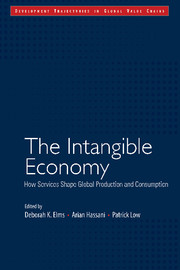Book contents
- Frontmatter
- Contents
- List of Figures, Tables and Boxes
- Acknowledgements
- 1 Introduction
- 2 Contextualizing Services in the World Economy
- 3 Services and Development: Priorities for Reform
- 4 Gainfully Linking into Global Value Chains: A Middle-Income Country's Perspective
- 5 Who Governs Global Value Chains?
- 6 Supply Chain Finance
- 7 Services and Economic Integration in ASEAN
- 8 Indian IT Firms: The Push for Innovation
- 9 Leveraging Business Process Outsourcing for Growth
- 10 Services in Global Value Chains and the Impact of Policy
- Contributors
- Index
- Development Trajectories in Global Value Chains
9 - Leveraging Business Process Outsourcing for Growth
Published online by Cambridge University Press: 19 October 2018
- Frontmatter
- Contents
- List of Figures, Tables and Boxes
- Acknowledgements
- 1 Introduction
- 2 Contextualizing Services in the World Economy
- 3 Services and Development: Priorities for Reform
- 4 Gainfully Linking into Global Value Chains: A Middle-Income Country's Perspective
- 5 Who Governs Global Value Chains?
- 6 Supply Chain Finance
- 7 Services and Economic Integration in ASEAN
- 8 Indian IT Firms: The Push for Innovation
- 9 Leveraging Business Process Outsourcing for Growth
- 10 Services in Global Value Chains and the Impact of Policy
- Contributors
- Index
- Development Trajectories in Global Value Chains
Summary
Introduction
The outsourcing of business processes, also referred to as business process outsourcing (BPO), has enabled businesses to make their operations more scalable, flexible, resilient and cost effective, while delivering better service and value to their customers. Globally, the BPO industry has also created millions of jobs in low-cost countries, propelling economic development. The sector has also contributed to job creation for underprivileged youth, catalyzing social empowerment and poverty reduction. Providing a channel into the global services market, governments around the world have realized the potential of the sector for growth and socio-economic development.
Governments across Asia, Africa and Latin America have adopted innovative strategies to become significant players in the BPO value chain. This chapter tries to unravel the BPO value chain and analyse the approaches some of the countries have taken to become leaders in the sector by assessing their inherent strengths and best practices. In conclusion, this chapter provides insights and an evolutionary analysis into making an emerging BPO location attractive vis-à-vis the dynamics at play in the sector.
BPO value chain
BPO is defined as the procurement of services that are non-core to the organization but improve efficiency, reduce costs and enable focus on key business operations (Parikh and Mukherjee, 2013). The services are procured mainly from a third-party firm that operates from a low-cost country. BPO involves outsourcing of back-office functions such as finance and accounting (F&A) and human resource management (HRM) (NASSCOM, 2012). Frontoffice functions, such as customer interactive services (CIS) that require regular interaction with customers through multiple channels, are also a part of the BPO value chain (NASSCOM, 2012).
While most BPO processes, like F&A and human resource organization (HRO), are transaction-oriented, outsourcing of knowledge-intensive processes like business analytics and legal services involves processes that demand strong domain knowledge and reasoning abilities (NASSCOM, 2013). CIS processes require multichannel interaction with a large component of voice interaction through call centres. Industry vertical-specific BPO, such as services for the insurance industry, are tailored for the industry's requirements and demands. Business value delivered by BPO services has a direct correlation with the human knowledge and capital required to execute the process (Gereffi and Stark, 2010). This means that a more complex task has a higher strategic value and contributes more to the business’ revenue and success.
- Type
- Chapter
- Information
- The Intangible EconomyHow Services Shape Global Production and Consumption, pp. 143 - 166Publisher: Cambridge University PressPrint publication year: 2017

